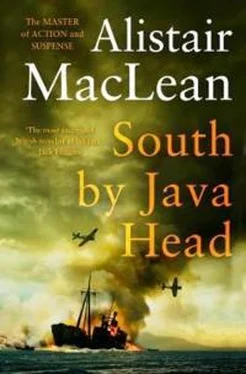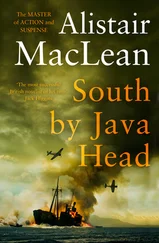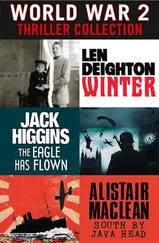And now, leaning on the useless tiller, McKinnon sitting armed and still watchful by his side, Nicolson tried to thrust aside the nagging, dominating pains of thirst and swollen tongue and cracked lips and sunblistered back and to assess the damage caused, the complete change brought about by those terrible days that had elapsed since the storm had ended, endless, torturing hours under the pitiless lash of the sun, a sun at once dreadfully impersonal and malignant beyond belief, a sun that steadily grew more and more intolerable until it drove helpless, uncaring men over the edge of breakdown and collapse, physical, moral and mental.
The old spirit of comradeship had gone, vanished completely as if it had never been. Where earlier every man had sought only to help his neighbour, now most sought only to help themselves, and their indifference to their neighbour’s welfare was absolute. As each man received his pitiful portion of water or condensed milk or barley sugar – the biscuits had come to an end two days ago – a dozen greedy, hostile eyes followed every movement of thin clawed hands and thirst-cracked lips, intent on making sure that he received his exact ration and not a drop or nibble more. The greed, the starvation lust in bloodshot eyes, the ivory-knuckled clenching of sun-dark wasting hands, became especially terrible to see whenever young Peter was given an extra drink and some of the water dribbled down his chin and dripped on to the hot bench, evaporating almost as it touched. They were at the stage now when even death appeared an almost attractive alternative to the excruciating torture of their thirst. McKinnon had need of the gun in his hand.
The physical change for the worse was, if anything, even more serious than the moral collapse. Captain Findhorn was deep sunk in coma, but a restless pain-filled coma, and Nicolson had taken the precaution of tying him loosely to the gunwale and one of the thwarts. Jenkins, too, was tied down, although still conscious. Conscious, but in a private hell of indescribable agony: there were no bandages, no protection left for the terrible burns he had received just before they had abandoned the Viroma , and the blazing sun had lacerated every inch of exposed flesh until he had gone crazy with the pain. His finger-nails were blood-stained from his insane clawing of raw burning flesh. His wrists were now lashed together, the rope tied to a thwart, not to prevent further pain-maddened scratching but to prevent him from throwing himself overboard, as he had twice tried to do. For long minutes he would sit without moving, then he would fling all his strength against the rope that held his bleeding wrists, his breathing hoarse and quick with agony. Already Nicolson was wondering whether he should just cut him loose, wondering what moral justification he had for condemning the seaman to die a slow lingering death on the rack instead of letting him finish it all, finish it quickly and cleanly, in the waiting waters over the side. For he was going to die anyway: he had the look of death about him.
Evans’s gashed arm and Walters’s savagely mutilated wrist were becoming steadily worse. All medical supplies were gone, their recuperative powers were gone and salt-water drying in tattered bandages had inflamed the open wounds.
Van Effen was in little better case, but his wound had been more recent and he had innate toughness and reserves of stamina far beyond the ordinary: he lay still for hours at a time, reclining on the bottomboards, shoulders braced against a thwart and staring for’ard. He seemed to have passed beyond the need for sleep.
And the mental breakdown had gone furthest of all. Vannier and the old second engineer had not yet slid over the edge of sanity, but both showed the same symptoms of increasing lack of contact with reality, the same long periods of withdrawn melancholy silence, the same occasional aimless mutterings to themselves, the brief, apologetic half-smiles if they realised they were being overheard, then the relapse once more into melancholy and silence. Lena, the young Malayan nurse, showed only the melancholy, the utter disinterest, but never talked, to herself or anyone, at any time. The Muslim priest, on the contrary, showed no melancholy, no emotion whatsoever, but was silent all the time: but then he was always silent, so it was impossible to be sure of him one way or the other. It was impossible, too, to be sure about Gordon, one moment widely smiling with staring, unfocused eyes, the next, head sunk in unmoving despair. Nicolson, who had the profoundest distrust for Gordon’s calculated cunning and who had tried more than once, without success, to persuade Findhorn to get rid of him, watched him with expressionless face: the symptoms might be real enough, but they might equally well be the symptoms of a man who had read some quasi-medical article on manic-depressives and hadn’t quite got the hang of it. But there was, tragically, no doubt about the young soldier, Sinclair: all contact with reality lost, he was quite insane and had all the classic symptoms of acute schizophrenia.
But the collapse, the physical and mental breakdown, was not complete. Not quite. Apart from Nicolson, there were two men who remained quite untouched by weakness and doubt and despair – the bo’sun and the brigadier. McKinnon was the McKinnon of old, unchangeable, apparently indestructible, still with the slow smile and the soft voice and the gun always in his hand. And the brigadier – Nicolson looked at him for the hundredth time and shook his head in unconscious wonder. Farnholme was magnificent. The more their circumstances deteriorated into hopelessness, the better the brigadier became. When there was pain to be eased, sick men to be made more comfortable or shielded from the sun, or water to be baled – it was seldom enough, now, that the floorboards weren’t covered, and a random bullet on the island had smashed the manual pump – the brigadier was there, helping, encouraging, smiling and working without complaint or hope of thanks or reward. For a man of his age – Farnholme would never see sixty again – it was a quite incredible performance.
Nicolson watched him in a kind of bewildered fascination. The fiery and fatuous Colonel Blimp of the up-and-at-’em-sir school he had met aboard the sinking Kerry Dancer might never have existed. Strangely enough, too, the affected Sandhurst drawl had vanished so completely that Nicolson found himself wondering whether he had imagined it in the first place: but there was no questioning the fact that the military expressions and Victorian oaths that had so heavily larded his conversation only a week ago were now so rare as to occasion comment whenever he used them. Perhaps the most convincing proof of his conversion – if that was the word – was the fact that he had not only buried the hatchet with Miss Plenderleith but spent most of his time sitting beside her and talking softly in her ear. She was now very weak, though her tongue had lost none of its power for pungent and acid comment, and she graciously accepted the innumerable small services Farnholme performed for her. They were together now, and Nicolson looked at them, his face expressionless, but smiling to himself. Had they been thirty years younger, he’d have laid odds on the brigadier having designs on Miss Plenderleith. Honourable designs, of course.
Something stirred against his knee, and Nicolson glanced down. Gudrun Drachmann had been sitting there for almost three days now, on the lower cross seat, holding on to the little boy when he jumped about the thwart in front of her – thanks to the unstinted supplies of food and water he received from Miss Plenderleith and McKinnon, Peter Tallon was the only person on the boat with excess energy to dispose of – and cradling him in her arms for hours at a time as he slept. She must have suffered severely from cramp, but never complained.
Читать дальше
Конец ознакомительного отрывка
Купить книгу










